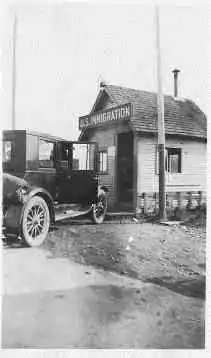Peace Arch Border Crossing
The Peace Arch Border Crossing is the common name for the border crossing which connects the cities of Blaine, Washington and Surrey, British Columbia on the Canada–United States border. The crossing is reached by Interstate 5 on the American side and by British Columbia Highway 99 on the Canadian side. It serves the most direct route between the major cities of Seattle, Washington and Vancouver, British Columbia, and the crossing is the third-busiest on the border with up to 4,800 cars a day. Wait times can be up to four hours; traffic lights exist on the southbound lane, with timers showing when the light will turn green so drivers can turn off engines, visit the park, and use public restrooms. Between the two border stations sits the Peace Arch Park, where visitors are free to cross the border within the confines of the park.[1]
| Peace Arch Border Crossing | |
|---|---|
_from_U.S._(Blaine%252C_WA).jpg.webp) The Canada Border Inspection Station at the Peace Arch Border Crossing | |
| Location | |
| Country | United States; Canada |
| Location |
|
| Coordinates | 49°00′00.4″N 122°45′15.8″W |
| Details | |
| Opened | 1891 |
| US Phone | (360) 332-8511 |
| Canadian Phone | 1-800-461-9999 |
| Hours | Open 24 hours |
| Website http://www.cbp.gov/contact/ports/blaine | |
Border inspection services at this crossing long predated the 1921 construction of the Peace Arch. The Canada border station is officially known as "Douglas" after the surrounding locality, although it has been known over the years as "White Rock" and "Surrey". The US border station is known as "Blaine – Peace Arch".
The crossing is less than a mile west of the Pacific Highway Border Crossing;[2] trucks and other commercial vehicles have been prohibited from using the Peace Arch crossing since the 1970s, in an effort to improve the visitation experience of the park.
History

Prior to the construction of the Peace Arch, the border region was congested with homes and businesses.[3] The US and Canada built inspection facilities near the border in the early 1900s. The area between the ports of entry was declared a bi-national park in 1939, and the buildings were demolished. The US built a substantial brick border station in 1936, and replaced it in the early 1980s, and again in 2009. Canada built a large wooden border station in 1929, and replaced it with a concrete border station in 1952. It was expanded and modified substantially over the years until a new border station was built in 2010.
References
- "The History of a Peace Park". Archived from the original on 2014-12-11. Retrieved 2014-12-06.
- "Chapter 6: Washington State". United Divide: A Linear Portrait of the USA/Canada Border. The Center for Land Use Interpretation. Winter 2015.
- "Custom Entry Ports in Surrey". Retrieved 2014-12-06.